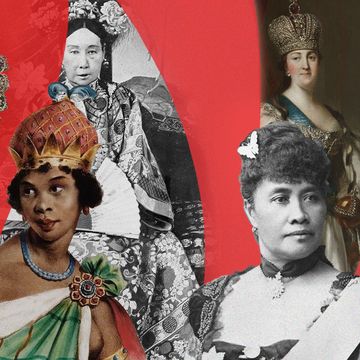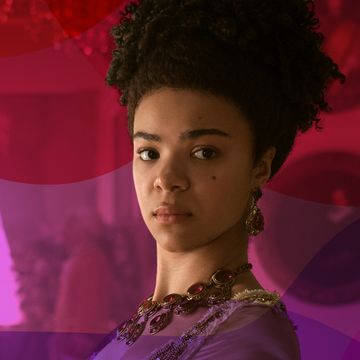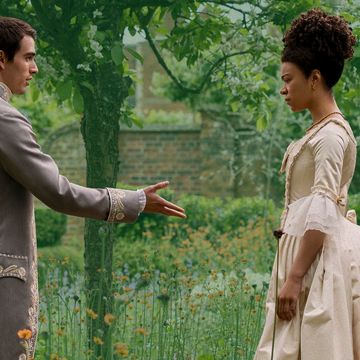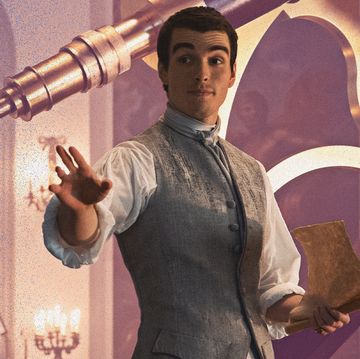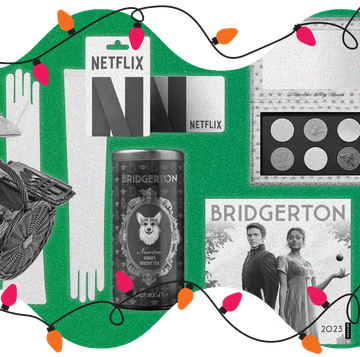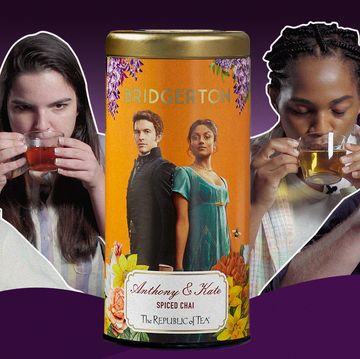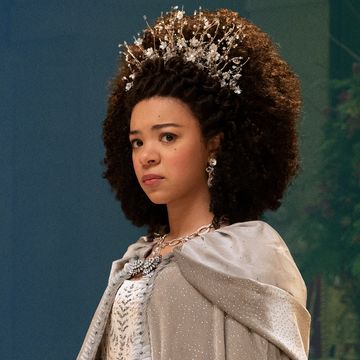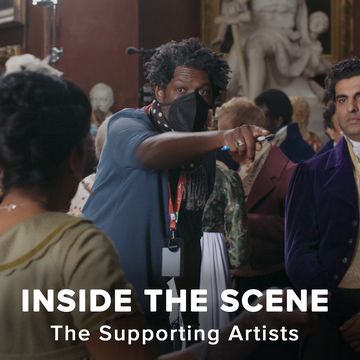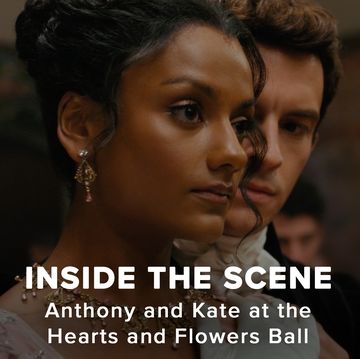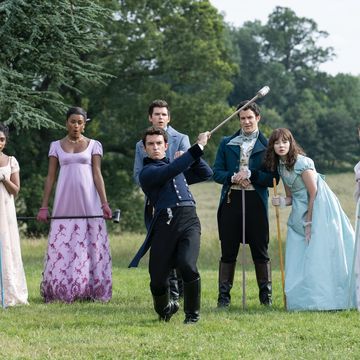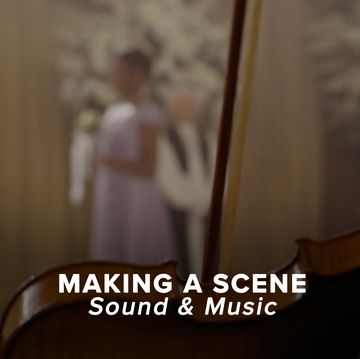When they finally fix the previously muted mics on Ruth Gemmell, Adjoa Andoh, and Golda Rosheuvel during my recent Zoom video call with the three Bridgerton co-stars, a trio of singing voices suddenly pipes through the speakers.
“It’s full of Cadbury goodness, and very small and neat. A finger of fudge is just enough to give your kids a treat.”
Even as an American, I recognize the Cadbury plug, but I have to look up the tune and only then do I discover that Gemmell, Andoh, and Rosheuvel were caroling a classic 1970s British jingle. When someone mentioned they could really go for a fudge, all three women, who were waiting for the mic to be fixed, spontaneously broke out in the song because it’s something they all remember from childhood.
It’s a silly and intimate moment between these women who make up the established guard of the world in Shondaland's hit Netflix series — Gemmell as Lady Bridgerton, the matriarch of the Bridgerton brood; Andoh as Lady Danbury, a noblewoman who gets what she wants, says what she means, and holds an almost immovable post atop Regency London; and Rosheuvel as Queen Charlotte, who needs no introduction. The three actresses were practically strangers only a few years ago, but as they round out season two of Netflix’s hit series, their friendships on and off set have grown and evolved in so many ways. They’ve sunk back into their matriarchal roles, are ready to bring some sense (and nonsense) to their wards, and want to show how women can wield their own power in a society that historically held them back.
And while it’s no secret that Shonda Rhimes is currently writing a Queen Charlotte spin-off series for Netflix that will dive deeper into the young lives of the Queen, Lady Bridgerton, and Lady Danbury, it’s mostly unknown what that will entail exactly, even to these three. But since we’re here to gossip about Bridgerton, Rosheuvel, Gemmell, and Andoh — like all good matriarchs — know when to stay mum and when to dish.
So, without further ado, as the season premiere of Bridgerton on Friday, March 25, draws closer, we sit down with the fabulous trio to clear up some royalty rumors and find out how they’re going to keep the kids in line this season, why their wisdom isn’t always welcomed (but is usually always needed), and who would reign supreme in a round of pall-mall.
VALENTINA VALENTINI: The new faces of the season are obviously a big part of the Bridgerton story. But equally important are the faces, the women specifically, who make up the established guard, those who have been through the wringer this society imposes on women. Why do you think it’s important their part of the story is illuminated?
RUTH GEMMELL: I think women of this age have something to say, and they also navigate the younger women through that mire.
ADJOA ANDOH: What’s fantastic about these three women is that they’re finding ways to be dynamic and to plow the furrow they choose to plow in spite of the fact that, in the hierarchy, they’re never at the top of the tree. Even the Queen is subject to the King; Violet’s husband is no longer with us, but her son has taken over her affairs. We’re all playing women in a period of British history where women were passed on from their families to their husband to become their property with no agency and no power, and we are finding ways to claw it back in strategic and subtle ways to get the outcomes we want without getting any of the pushback for doing what we’re doing. We’re talking about a Regency-era story of women, but that is a lot of women around the world to this day — I think so much about Afghanistan at the moment. Stories like Bridgerton continue to be relevant for the brilliance and the wisdom and the expertise and the verve of women not being given space. So, we’re taking up our space.
GOLDA ROSHEUVEL: Absolutely. And “actresses of a certain age” is a huge conversation at the moment. When you’re above 45, the story lines, the stories, and your agency as a woman, as an actress, as a storyteller kind of disappear. It’s joyous to be in the position that we are in — as actresses who are over 45 …
AA: What?!
GR: Yes, you are, darling.
AA: Dang.
GR: … and to be celebrating that and getting great stories and great lines.
RG: Throughout time, there’s always been the matriarch of a family who’s the spine of the family.
AA: Julia Quinn wrote these books, and they’re very female-led. And Shonda Rhimes has produced this whole endeavor. If you do statistics on audiences, who buys the most theater tickets? The most cinema tickets? Who watches the most TV? It’s women over 40. So, now they can watch something that speaks to their experiences as well.
VV: I want to go back to something you said about being subtle, Adjoa. These women do have to ride that fine line, don’t they? They can’t just be brazen about taking up space, like some young women this season try to accomplish.
AA: There’s something about the learning that all these women give to younger women. How do you have your cake and eat it too? That’s the lesson you need to learn — to navigate those rules to your best advantage without getting beaten by them.
RG: Also, in our characters’ lives, we’ve made those mistakes already. You look at somebody younger, and you kind of want to go, “No, don’t do that, honestly.” Of course, what they have to do, and what we would have done, you make those mistakes and find your path.
AA: There’s only so much advice that you can give, and at a certain point, people are not listening. They’ll do it anyway and then go, “Oh, yeah, that thing you said, I get it now.”
RG: It’s a rite of passage.
GR: I’m going to beat it over the head, but …
AA: You are going to say that phrase again, aren’t you?
GR: I am! For women of a certain age, there’s a kind of celebration that we’ve paid our dues, and we’re here, and we’re doing it. And, you know, we have learned from our mistakes. We’ve found our lanes, and we’re sticking to them, and we’re being joyous in it.
AA: I think about our mothers and our aunties and those older women. My mum was born in the Second World War in the basement of the Salvation Army Hospital in Liverpool. My grandmother ended up having five children during wartime! There are these mighty, powerful, sidelined creatures called “older women” who were doing these extraordinary things all the time and keeping the ship afloat at home …
GR: … and working and cooking …
AA: … and keeping a sense of humor and hanging out with her girlfriends and laughing. They were, are mighty women.
VV: Speaking of friendships, Ruth and Adjoa, you have some great scenes together this season. Did you two work on a backstory there? Either with showrunner Chris Van Dusen and via the script or on your own?
RG: I would say that we took everything that was on the page, but also we have become friends through working on the first season. And then you come to a second season with a more informed friendship, which builds trust, which helps you play better, in a way. I’m never one for necessarily doing a backstory, plus, I think the books have already given enough of a backstory, and then the words and the scenes inform all that.
AA: I like to know about the period that I’m working in, but I’m like you, Ruth: “These are the words on the page. How do I make a coherent and emotionally congruent logic of what’s there?” And when you’ve got Chris Van Dusen as the showrunner, that emotional congruency is there — you’ve just got to not trip over the furniture! We’ve all been doing this a long time — we can interpret the words on the page and make them feel like they belong to the flesh and blood, as it were. And we’re all quite playful, quite giggly, and none of us take ourselves too seriously. I mean, we all got changed in the toilets at the back of the theater above the pub, you know? So, there’s a delight in being able to do something this fabulous and this juicy.
VV: There are some parental revelations this season. But parenting young adults is such a difficult thing, I think, for both the parent and the “child.” How do you — either as yourself or in the context of Bridgerton — come to understand this dynamic in the story?
RG: I love those kids like they were my own.
GR: You have the rules of the period, sure, but I think the advice that people who love and care about you will want you to thrive will always be the same.
AA: The thing about period drama is that human beings have always been the same. We’ve got different frocks and better plumbing — thank you, Jesus! — but in terms of what human beings are like, I don’t think there’s any real difference. People still get scared and cross, and love and fear. So, many of the lessons, like what Lady Bridgerton says about love for her children and the value of finding love and being instinctive about it, trusting your instincts, that is universal and timeless.
VV: Now, Golda, there was something in the press recently that talked about a royal connection in your family.
GR: I mention one thing, and people have run with it!
VV: Well, I think it might be a fantasy many of us have — some distant connection to royalty.
GR: Okay. To clear up this phenomenon …
AA: Are you a princess?!
GR: No, I’m not a princess. My mother was in Barbados, looking after and living with her uncle, my great-uncle, who then became archbishop of Jamaica. While my mother was with my Uncle Louis, Princess Margaret came to town, and a friend of my mother’s uncle was hosting her. My mother was in social work; she founded the social-work department in Barbados. So, she was invited, along with other dignitaries, to a dinner that Margaret was at. And my mother sat opposite Margaret at said dinner.
AA: Was she a laugh?
GR: She was, but my mother said that she also behaved very badly. And that’s as far as my royal connection goes.
VV: Well, I’m glad we cleared that up. And as tenuous a link as that is, we’ve talked previously about the joy in getting to play aristocracy as Black women. Having filmed a second season now, does that still resonate?
GR: Playing a Black queen and being able to emotionally connect to my mother’s side, a white woman who was born in this country and who raised me, dragging me around to English countryside houses and castles, hiking on a Sunday, it’s really joyous to be able to celebrate that and connect with that side of it and that side of my journey. I come from dual heritage, so to get characters that can balance my passion for storytelling is great.
AA: My brother, who lives in Los Angeles, is staying with me at the moment. Our father is African, and our mother, as I said earlier, white, English, born in the north. He and I were talking about that thing when, if I go to Ghana, I am “obruni,” which means white man. Or I can be here, and there will be people going, “Go back to where you came from!” And I’m like, where? The Cotswolds? As many people do, we carry a combination of histories and heritages, and on a good day, it’s a fantastic cornucopia of history to draw on. On a tough day, it’s like where do you belong? Those things are always going on if you’ve grown up in this culture. And I can do a stately home all day long or a country garden, and I can give you chapter and verse on English kings and queens. But I think anybody in a British colonized country could do that too. But if you’re raised in the culture, you love the culture. I love Shakespeare and Austen, but for so long it’s been, “You can love it, darling, but you can’t be part of it. Not actually when we’re performing it.” And so, that’s all changing now. We’re living in a world that acknowledges the truth of our existence, which is that we are multilayered and multifaceted and multi-historied. Bridgerton isn’t a documentary or a searing drama. We’re doing a fabulous fantasy story with roots of truth in it. Queen Charlotte did have African antecedents. It’s brilliant what Shondaland has done with the show.
When you have a little girl dressed up as Lady Danbury who gets in touch with you on Twitter, it’s a really choking feeling. It’s beautiful. And that’s what I mean about the wider embracing of the show. It’s saying to everybody, “Come on. You’re allowed in. You have value, and we see you.”
GR: We have a big following in Brazil from the books. I get lots of messages from our Brazilian fans thanking us for taking these stories and making a world that is inclusive, diverse, and represents the world that we’re living in.
VV: Now, I know you can’t talk about the spin-off at all in any detail — I think Shonda is still writing it! — but …
AA: There’s a spin-off?! What the hell!
VV: Pretty much accurate, yes. But can you talk about it even in the vaguest of terms? What do you hope for this prequel story?
RG: It’s about Queen Charlotte and her younger self, and those of the lives of Danbury and Violet. That’s all I can say.
GR: We’re expanding the Bridgiverse.
AA: Right. We can say that it’s coming from the Shondaland stable, so it will be Shondaland-esque in the quality. We’re not leaving the Bridgerton world.
RG: There aren’t space suits, are there? Is it set on Mars?
GR: We’re still in the umbrella of Bridgerton. We’re still in the world of Julia Quinn. If you see the Queen walk out of that door, she’ll enter through the spin-off.
RG: It will be interesting if they start connecting the two.
GR: Oh, that would be great.
AA: This is slightly left field, but you know that thing they quite often do now in a hospital ward with somebody who’s very poorly or very elderly, they’ll put up a photograph of them when they were young. That’s what I think about this show. I’m not saying that we’re poorly or elderly …
RG: Yeah. Cheers, Adj.
AA: We are women of … no, I won’t say it. But no, what I’m saying is that when you look at somebody, and you think, “What made you like you are now? When you were younger, what was the journey? Who is the person still inside of you?” Because I still feel that I’m probably about 14. So, maybe we’ll get to see a little window into the world of that person.
VV: The Queen is as insatiable for her gossip as ever, and — oh! By the way, she’s a bit insatiable for something she keeps snorting up her nose! What is that?
GR: Snuff. Tobacco. It’s a glucose thing they mock up for me.
AA: Yes, it’s snuff. There’s all different ways of taking it. Snuff is still quite popular in Scandinavia.
RG: Do you get a sugar rush?
GR: I do, yeah!
AA: All of the girls here — Ruth, your character likes a drink. Mine likes a drink too, and a smoke. The Queen enjoys her snuff. I love that. It’s quite a masculine thing, isn’t it? To have those vices.
RG: It’s empowering for women.
VV: It is fun, and so real, to see them let their hair down, if you will, in that way. But back to my question — about the Queen’s need for ever more gossip. How do you handle gossip in your own life?
GR: Oh! That’s an interesting question. I kind of smile at it. I hope it’s never horrible or cruel, but I love a negativity. Negativity is really important for us in the world because I think it gives conversation. I think it throws debate.
AA: It’s provocative.
GR: It is provocative. But I think it gives a good balance. We need balance. We need the yin and the yang, and we need to be open and willing to talk about it.
RG: I do like a bit of gossip, but I also can hold my tongue. Sometimes. If it’s important, I will hold my tongue.
AA: It’s about what you let have power over you. If I talked about something and there’s some pushback about it, it’s like, I’m just not going to read. Because if I don’t know about it, it doesn’t exist. If you want to get lost in it, that’s really not my business. There is an off switch. I like the power of being able to make choices about things, but having conversations that are provocative that make you think about things is great. That’s the thing about this show. People go, “There wouldn’t be Chinese people there or Black people there — it’s Regency England!” And you go, “Well, okay, let’s have the conversation.” There is a place for it. That thing that Johnny Rotten used to say, “Anger is an energy.” Try and use things constructively that will be productive for you, and sometimes it’s joy, and sometimes it’s anger.
VV: Golda, you auditioned for Lady Danbury’s role originally, right?
GR: I did. I think it went to somebody else, somebody shocking.
AA: Yes, I think they were awful.
RG: I think quite a few of us auditioned for different roles, actually. I auditioned for Lady Cowper.
GR: Really?!
RG: Yes.
AA: Well, that’s a step up!
RG: Yes, I’ve got a bigger house now. And lots more frocks. More children.
VV: Could you even imagine these roles being switched around now?
GR: No, I’ll stay the Queen, thanks. Do you want to be anybody else, Adjoa?
AA: No. I think that the characters we are now, they’re 50 percent the writing, and they’re 50 percent us. I can’t imagine it now because we’ve poured ourselves into the shape of these people, and the flesh is fused, as it were.
VV: Finally, this is a very sports-focused season with the games of the ton, like we had in season one, and now the actual games people played back then, like pall-mall. Now, I know none of your characters gets to play on-screen, but who do you think would win in a round of pall-mall?
RG: The Queen. Even if you were losing, I think we’d let you win.
GR: Yeah, I’m going to say me because I used to play as a child in my grandmother’s back garden. But it was called croquet. Same game, different name. I still play croquet, actually.
AA: Do you?! Oh, I’d love to play croquet with you!
GR: We should all play!
RG: I’m not sporty in the slightest.
AA: I am not good at sports, but I love all sports.
GR: You can come and have tea, Ruth. And don’t eat the cardboard cake.
RG: No, no. I won’t.
Valentina Valentini is a London-based entertainment, travel, and food writer and also a Senior Contributor for Shondaland. Elsewhere she has written for Vanity Fair, Vulture, Variety, Thrillist, Heated, and The Washington Post. Her personal essays can be read in the Los Angeles Times, Longreads, and her tangents and general complaints can be seen on Twitter at @ByValentinaV.
Get Shondaland directly in your inbox: SUBSCRIBE TODAY





